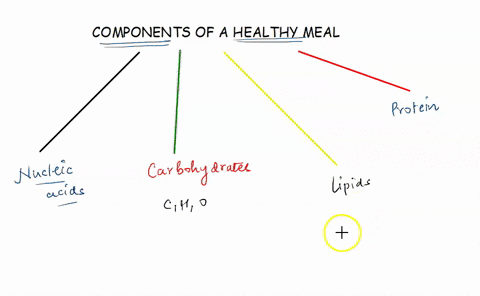Discover that the field of nutrition is defined by which three elements. The field of nutrition is defined by three elements: food, nutrients, and the body’s physiological processes. Nutrition focuses on the study of food and its relationship to health, including how nutrients are digested, absorbed, and utilized by the body.
These elements contribute to our understanding of the impact of different foods on our overall well-being. A healthy diet is essential for preventing and preserving a variety of disorders. It involves the study of food composition, nutrient requirements, and the physiological processes that occur within our bodies.
By understanding these three elements, nutritionists and health professionals can provide personalized dietary recommendations and interventions to optimize health outcomes. We will explore the field of nutrition and its significance in promoting a healthy lifestyle.

Credit: www.britannica.com
The Science Of Nutrition
Nutrition is a multi-disciplinary field that encompasses the study of food, its nutrients, and their impact on health. It is defined by three key elements: macro and micronutrients, the role of diet in maintaining health, and the impact of food on disease prevention and treatment.
Key Components
These three elements form the cornerstone of the science of nutrition. Firstly, macro and micronutrients are the essential substances found in food that are necessary for growth, development, and overall well-being. Understanding the composition and functions of these nutrients enables experts to formulate balanced diets tailored to individual needs.
Importance In Health
Secondly, the science of nutrition plays a critical role in maintaining health. It contributes to disease prevention and management, facilitates healthy growth and development, and supports overall well-being. Proper nutrition is vital for the optimal functioning of the body’s systems and organs.
Fundamental Elements Of Nutrition
Macro And Micronutrients
These essential nutrients include proteins, fats, carbohydrates, vitamins, and minerals.
Energy Balance And Metabolism
The balance between calories consumed and calories expended plays a crucial role in maintaining a healthy metabolism.
Dietary Guidelines
- Recommendations on consuming a variety of foods to meet nutritional needs.
- Give priority to fruits, vegetables, whole grains, lean meats, and healthy fats.
Interaction Of Nutrition With The Human Body
Understanding the interaction of nutrition with the human body is crucial for maintaining good health and overall well-being. Through the process of digestion and absorption, the nutrients we consume are broken down and utilized by the body. Furthermore, these nutrients have a significant impact on various organ systems, contributing to their proper functioning. In this article, we will explore three essential elements of nutrition: digestion and absorption, nutrient utilization, and the impact on organ systems.
Digestion And Absorption
1. Digestion:
Digestion is the process by which food is broken down into smaller molecules, making it easier for the body to absorb and utilize them. It begins in the mouth, where the saliva breaks down carbohydrates and fats. Then, as the food progresses through the digestive system, it is further broken down by stomach acids and digestive enzymes. This breakdown allows the nutrients to be extracted and absorbed efficiently.
2. Absorption:
Absorption is the process by which the broken-down nutrients are taken up into the bloodstream and transported to the cells and tissues of the body. This process predominantly takes place in the small intestine, where the nutrients are absorbed through the intestinal wall and carried within the bloodstream to where they are needed most. Efficient absorption ensures that the body receives the necessary nutrients to support its vital functions.
Nutrient Utilization
1. Carbohydrates:
- Carbohydrates, such as sugars and starches, serve as the body’s primary source of energy.
- They are broken down into glucose, which is converted into usable energy or stored as glycogen in the liver and muscles.
2. Proteins:
- The synthesis, maintenance, and repair of bodily tissues depend on proteins.
- They are broken down into amino acids, which are used for various metabolic functions and as building blocks for new proteins.
3. Fats:
- Fats are a concentrated source of energy and serve as a protective cushion for the organs.
- They are broken down into fatty acids and used for energy production, hormone synthesis, and cell membrane structure.
Impact On Organ Systems
1. Cardiovascular System:
Nutrition plays a vital role in maintaining heart health and blood vessel function. A diet rich in fruits, vegetables, whole grains, and lean proteins can help reduce the risk of cardiovascular diseases like heart attack and stroke.
2. Immune System:
Proper nutrition strengthens the immune system, making the body more resilient to infections and diseases. Key nutrients like vitamin C, vitamin D, and zinc play a critical role in immune function.
3. Musculoskeletal System:
Nutrition is essential for bone health and muscle strength. Adequate intake of calcium, phosphorus, magnesium, and vitamin D supports bone density and prevents conditions like osteoporosis.
4. Nervous System:
Nutrition influences brain health and cognitive functions. Omega-3 fatty acids, B vitamins, and antioxidants found in various foods are known to support brain development, memory, and overall mental well-being.

Credit: www.numerade.com
Role Of Nutrition In Disease Prevention
Nutrition plays a vital role in disease prevention. The food we consume has a direct impact on our health, and making the right dietary choices can help protect us against various illnesses. Understanding the relationship between nutrition and disease prevention is crucial in striving for a healthier lifestyle.
Chronic Diseases
Chronic diseases are long-lasting conditions that often develop over time and can significantly impact one’s quality of life. However, many chronic diseases can be prevented or managed through proper nutrition. A balanced diet, rich in essential nutrients such as vitamins, minerals, and antioxidants, can help reduce the risk of chronic illnesses like:
- Heart Disease
- Diabetes
- Cancer
By maintaining a healthy weight and limiting the intake of processed foods high in saturated fats, sugar, and sodium, individuals can significantly lower their chances of developing these chronic diseases.
Diet-related Conditions
Aside from chronic diseases, poor nutrition can also lead to various diet-related conditions. These conditions directly result from inadequate diets that lack the necessary nutrients for optimal health. Some common diet-related conditions include:
- Iron-deficiency Anemia
- Osteoporosis
- Vitamin Deficiencies
Iron deficiency anemia occurs when the body lacks sufficient iron, leading to fatigue and weakness. A diet rich in iron sources, such as leafy greens and lean meats, can help prevent this condition. Osteoporosis, on the other hand, is a bone disease that can be prevented through consuming calcium-rich foods like dairy products and fortified cereals.
Vitamin deficiencies can have severe implications for overall health. Incorporating a variety of fruits, vegetables, whole grains, and lean proteins into one’s diet ensures an adequate intake of essential vitamins and minerals.
When it comes to disease prevention, nutrition plays a fundamental role. By making conscious dietary choices and prioritizing a well-balanced meal plan, individuals can significantly lower their risk of chronic diseases and diet-related conditions.
Evaluating Nutritional Needs
Evaluating Nutritional Needs is essential to determining an individual’s optimal dietary requirements. This process involves considering various factors, such as Assessment tools and Individual variations.
Assessment Tools
There are several tools professionals use to assess a person’s nutritional status. These include dietary surveys, blood tests, and bioelectrical impedance analysis.
Individual Variations
Each person has unique nutritional needs based on factors such as age, gender, activity level, and medical conditions. Understanding these variations is crucial for effective dietary planning.
Nutrition In Different Life Stages
In the field of nutrition, understanding the unique nutritional needs throughout different stages of life is essential for maintaining optimal health. Nutrition plays a vital role in our growth, development, and overall well-being. It is interesting to note that the field of nutrition is defined by three important elements, namely infancy and childhood, adulthood, and aging. Let’s explore how nutrition varies in each of these life stages.
Infancy And Childhood
During infancy and childhood, proper nutrition is crucial for growth, development, and cognitive function. The nutritional needs of infants and young children differ significantly from those of adults. Here are a few key aspects to consider:
- Breastfeeding or formula feeding, provides essential nutrients for infants.
- Introducing solid foods rich in vitamins, minerals, and proteins is important.
- Adequate intake of essential nutrients like iron, calcium, and vitamin D is essential for bone and brain development.
Adulthood
As individuals enter adulthood, nutrition continues to play a critical role in maintaining a healthy lifestyle. Here are some important things to remember:
- It is crucial to have a balanced diet rich in whole grains, lean meats, fruits, vegetables, and healthy fats.
- Consuming the right amount of calories to meet energy needs and maintain a healthy weight is important.
- Adopting healthy food choices and mindful eating habits can prevent chronic diseases and promote overall well-being.
Aging
As we age, our nutritional needs undergo certain changes, and taking proper care of our diet becomes crucial. Here are some important considerations:
- Increasing the intake of nutrient-dense foods to meet the nutritional needs of aging bodies.
- Focusing on foods rich in vitamins, minerals, antioxidants, and omega-3 fatty acids to support brain health and reduce the risk of chronic diseases.
- Paying attention to hydration and ensuring sufficient water intake to support overall health.
In conclusion, understanding the different nutritional requirements throughout various stages of life can help individuals make informed food choices and lead healthier lives. Whether it’s infancy and childhood, adulthood, or aging, nutrition remains a vital aspect of our overall well-being. By prioritizing nutrition in each life stage, we can pave the way for a healthier and happier future.
Trends And Controversies In Nutrition
The field of nutrition is a complex and ever-evolving area of study that is defined by three key elements: diet, health, and social aspects. These three elements work together to shape our understanding of nutrition and its impact on our overall well-being.
Fad Diets
Fad diets have become increasingly popular in recent years due to their promise of quick weight loss and improved health. However, many of these diets are based on restrictive eating patterns or the avoidance of certain food groups, which can lead to nutrient deficiencies and other health problems. It’s important to approach fad diets with caution and consult a registered dietitian or healthcare professional before making any drastic changes to your eating habits. Remember, sustainable and balanced eating habits are key to long-term health and wellness.
Supplementation
Supplementation refers to the use of vitamins, minerals, or other dietary supplements to enhance one’s overall nutritional intake. While some individuals may benefit from supplements, such as those with specific medical conditions or dietary restrictions, it’s essential to remember that supplements should never replace a healthy, balanced diet. It is important to discuss any supplement use with a healthcare professional to ensure safety and effectiveness.
Food Industry Influence
The food industry plays a significant role in shaping our dietary choices and preferences. While many food companies strive to provide nutritious options, there can also be a strong influence on marketing and advertising that promotes less healthy foods. This influence can make it challenging for individuals to make informed choices about what they consume. It is important to be mindful of the food industry’s role in our dietary decisions and prioritize a critical evaluation of nutrition claims and food labeling.

Credit: www.numerade.com
The Future Of Nutrition Research
Nutrition science is advancing rapidly, driven by groundbreaking research in the fields of nutrigenomics, food technology, and biochemistry.
Advancements In Nutrigenomics
Nutrigenomics explores how our genes interact with nutrients in food, influencing our health and well-being.
Innovations In Food Technology
New technologies are revolutionizing the way we produce and consume food, enhancing nutritional quality and safety.
Frequently Asked Questions Of The Field Of Nutrition Is Defined By Which Three Elements
What Are The Elements Of Nutrition?
The elements of nutrition include carbohydrates, proteins, fats, vitamins, minerals, and water. These essential components support overall health and body functions.
What Are The Three Basic Elements Of Good Nutrition?
The three basic elements of good nutrition include a balanced diet, essential nutrients, and proper hydration. These elements are crucial for maintaining overall health and well-being. A balanced diet ensures the intake of all essential nutrients, while proper hydration supports bodily functions and promotes good health.
What Are The Three Areas Of Nutrition?
The three areas of nutrition are macronutrients, micronutrients, and water. Macronutrients provide energy and include carbohydrates, proteins, and fats. Micronutrients are essential for health and include vitamins and minerals. Water is important for hydration and bodily functions.
What Are The Three Points Of Nutrition?
The three key points of nutrition are eating a balanced diet, staying hydrated, and portion control.
Conclusion
In the sphere of nutrition, the core elements reign: food quality, balanced diet, and health. This holistic approach shapes the field’s essence, guiding us to optimal well-being and vitality. Embracing these three pillars leads us towards a nourished and thriving existence.
Dive deeper into the world of nutrition and unlock the secrets to a wholesome life.

I am a health writer and blogger based in the US and UK. I have been with the health department for six years. And I give advice on various health problems and solutions. I have a lot of experience in health matters and I share it here.

